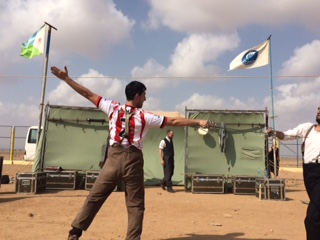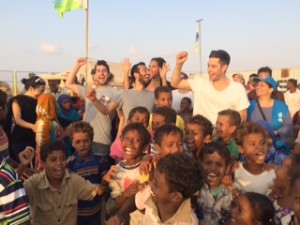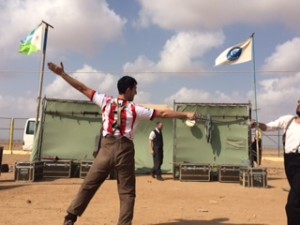22nd March 2016 Addis Ababa, Ethiopia
Shakespeare’s Hamlet for Refugees in Djibouti

By Ruth Bradley-Jones
Can you imagine two journeys more different? That of 3000 Yemeni refugees http://ow.ly/ZNIbB fleeing conflict in their homeland across the 30 mile stretch of water to the dessert in Djibouti; and the 260,000 miles and 160 countries travelled by the London company of the Shakespeare’s global tour of Hamlet http://ow.ly/ZNP11. But in that moment, in those three dusty hours, performers and audience alike forgot their pasts, and stopped questioning their futures, caught up in the moment of the performance, of the make-believe, of the action caught in the circle of excited kids, and quat-chewing men and bemused, curious women.
 Not able to travel to Yemen directly, because of the very conflict these refugees have fled, Shakespeare’s Globe-to-Globe, in their incredible feat of performing Hamlet in every country in the world in two years, came to the Markazi refugee camp in Obock, northern Djibouti, and performed to over 300 refugees and migrant from Yemen. When we arrived the kids came running – huge excitement! They had been told some English actors were coming to put on a play. “Mr Bean, Mr Bean!”. Hamlet may be one of the most translated plays across time and continent (second only to Cinderella, apparently), but he offers no contest to Mr Bean, who, it turns out, transgresses language and culture entirely. So, Hamlet, the challenge to be UK brand ambassador #1 has been thrown…
Not able to travel to Yemen directly, because of the very conflict these refugees have fled, Shakespeare’s Globe-to-Globe, in their incredible feat of performing Hamlet in every country in the world in two years, came to the Markazi refugee camp in Obock, northern Djibouti, and performed to over 300 refugees and migrant from Yemen. When we arrived the kids came running – huge excitement! They had been told some English actors were coming to put on a play. “Mr Bean, Mr Bean!”. Hamlet may be one of the most translated plays across time and continent (second only to Cinderella, apparently), but he offers no contest to Mr Bean, who, it turns out, transgresses language and culture entirely. So, Hamlet, the challenge to be UK brand ambassador #1 has been thrown…
And, of course, the actors pulled it off. It wasn’t always easy. Woollen tunics and chain mail in Djiboutian heat in the desert seemed an unfair handicap; the plastic chairs, arriving 30 minutes into the performance, nearly stole the show; and for several minutes the actors had to compete with the Adhan call to prayer. But they commanded the audience’s attention with their energy, their music, and their superb performances.
Did the audience understand? Er, well… there was a lot of clapping and cheering at the most tragic moments… but they were scared of the King’s ghost, they recognised friendships and love in the play and they got it was a family feud; and I think they understood why most of the cast was lying down at the end.
By the end of the show, as we all clustered round, wanting to be part of the team as we took the make-shift stage apart, wanting to share the energy, wanting that moment to draw out longer, there was, for that moment, a sweet connection. We had all come to that moment from very different lives: a travelling troop of British actors (and some straggling British diplomats!), some Yemeni refugees – fishermen, one-time engineers, teachers, all waiting to be allowed to restart their lives somewhere, an Egyptian UNHCR officer, and a Syrian camp manager, now a refugee himself. And we all had very different, and for many, uncertain, futures to go to. But right then, as the setting sun’s dusky colours fell around us, we were lost to each other in a buzz of laughter, play, chanting and dance.
Life is fickle and can turn quickly – Hamlet learnt that, and sadly so have the refugees at Markazi camp. But, despite their adversity, the refugees we met treated us – strangers with a strange mission – with such interest and friendship, sharing their stories, but listening to Hamlet’s, being inspired, but also the cause of our inspiration. A powerful moment of human bonding, not to be easily forgotten. I’m not sure Mr Bean could have pulled that off.